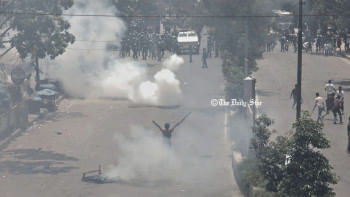Make Aylan's home safe
The image of the three-year-old Syrian boy Aylan's lifeless body stimulated public outcry to deal with the refugee crisis. The body of Aylan Kurdi, who drowned along with his mother and his five-year-old brother, washed up on a beach near the Turkish resort town last week. The photograph had captured him lying face down in the surf, wearing a red t-shirt and shorts. This photograph coincidentally attracted the attention of international leaders, undoubtedly due to the immense media coverage. French President Francois Hollande immediately corresponded with Turkish president Recep Tayyip Erdoğan and other European leaders, stating that the picture must be a reminder of the world's responsibility. British Prime Minister David Cameron, who was silent earlier regarding the crisis, said he was deeply moved by the image of Aylan. Irish Prime Minister Enda Kenny described the refugee crisis as a "human catastrophe" and found the picture "absolutely shocking".
If we look back at the Syrian crisis, it is observed that most such refugees are driven by an urgent need to escape the country, which has already become a living hell.
The Syrian conflict started during the so-called Arab Spring, and clashes between Syrian President Bashar al Assad and his several oppositions including the Islamic State of Iraq and the Levant (ISIL). Barrel bombs have been dropped continuously on the opposition-led areas by Syrian army helicopters. This conflict has killed thousands of people over the past four years. To further elaborate, ISIL militants have also been responsible for the mass exodus. The militant group occupied a key town along the Turkish border that triggered a rush of frantic refugees driving into Turkey.
According to an estimate by the UN, around 250,000 people have been killed and more than one million wounded since March 2011 in Syria due to the conflict. About half of the country's population has been displaced. A recent UN report said that since 2011 more than 2,000 Syrians refugees have drowned while desperately trying to reach Europe.
What is the role of world leaders in the crisis? Instead of taking any effective initiative to stop the war, they are providing support to both the Syrian government and the opposition groups, militarily, logistically and diplomatically. Iran and Russia provides military support to the Syrian government, whereas the main opposition body, the Syrian coalition, receives logistic and political support from major Sunni states in the Middle East, Turkey, Qatar and Saudi Arabia. Moreover, France, Britain and the US also provided political, military and logistic support to the opposition.
One can easily raise a question as to what the role of UNHCR is in this regard. The UNHCR's 1950 statute clearly states its core mandate within two principal areas on refugee protection. Its first mandate is to work with states to ensure refugees' access to protection. In other words, those outside of their country of origin, with a well-founded fear of persecution, would be assured of certain clearly defined rights. Secondly, to ensure that refugees are able to have access to durable solutions and are either reintegrated within their country of origin or permanently integrated within a new country.
Aylan's father took several initiatives for resettlement, to migrate formally to countries including Canada, but his application was rejected. Aylan was born in the Syrian city of Kobane. After moving between various towns, his family settled in Turkey. The family then returned to Kobane at the beginning of 2015 and again returned to Turkey in June 2015 when ISIL reoccupied Kobane. After several failed initiatives to take the family to a safe place, Aylan's father made the last attempt that ended in tragedy. He failed to migrate because he could not manage an exit visa from Turkey. They did not have Syrian passports, valid Turkish visas or even UNHCR's refugee documents, and therefore did not qualify for exit visas. Hence, getting out of Turkey was his only option to avoid arrest and detention by Turkish authorities. According to their mandates, UNHCR's effective mechanism to provide assistance to the family could probably have stopped them from taking the risky voyage.
British Prime Minister rightly realised that it is high time to solve the problem at source. Yes, only an end of the conflict in Syria would stop the flow of refugees. The UN must play its role to stop the devastating conflict. According to a report by the Global Centre for the Responsibility to Protect, the UN Security Council has not only failed to fulfill its basic function – the maintenance of international peace and security – it has also failed to uphold its Responsibility to Protect (R2P) the Syrian people. Hundreds of such images of drowning boat people in the Mediterranean Sea and in the Bay of Bengal in the last few months have sparked public outcry and calls for world leaders not only to change their attitude toward refugees but to deal with the root causes of the crisis. World leaders and the UN must take initiatives to stop the ongoing conflicts in Syria and other refugee source countries and come up with sustainable solutions.
The writer is a Research Associate/Lecturer at the BRAC Institute of Governance and Development (BIGD), BRAC University.

 For all latest news, follow The Daily Star's Google News channel.
For all latest news, follow The Daily Star's Google News channel. 



Comments